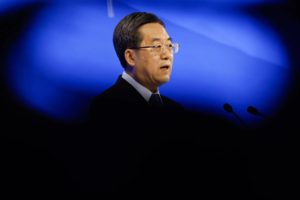
A senior Chinese leader called for increased global cooperation and opposition to protectionist measures, in a thinly veiled critique aimed at the US for destabilizing trade and geopolitical relations.
“We should jointly safeguard the free trade system, uphold open regionalism, and firmly oppose trade and investment protectionism,” Ding Xuexiang, the ruling Communist Party’s sixth-ranking official, said during his keynote speech at the annual Boao Forum on Thursday, attended by Asian leaders, global diplomats and business executives.
The four-day Boao gathering in the southern province of Hainan comes as Beijing intensifies a charm offensive to lure overseas investment. China has bolstered efforts to portray itself as a reliable partner as US President Donald Trump rattles markets with unpredictable tariffs and unnerves US allies with geopolitical maneuvers.
Ding also sought to reassure global investors by highlighting the strength of China’s economy and its commitment to innovation. He pointed to recent advancements in artificial intelligence, robots and new-energy vehicles as new growth drivers and vowed to broaden market access for foreign investors.
“No matter how the external environment changes, China will open wider to the world,” he said.
9:12
How the World Is Preparing for Trump’s Tariffs
Ding’s speech follows a week of Chinese efforts to woo international business leaders and foreign officials. Top executives including Apple Inc.’s Tim Cook, Qualcomm Inc.’s Cristiano Amon, Pfizer Inc.’s Albert Bourla and Saudi Aramco’s Amin Nasser attended the two-day China Development Forum in Beijing, where officials touted the economy’s potential for business.
Facing external headwinds, Chinese policymakers made boosting domestic demand the top economic priority this year. Lifting consumption will also increase its appeal to foreign investors after inbound investment fell to its lowest in over three decades last year.
Xuan Changneng, deputy governor of the Chinese central bank, repeated a pledge to cut interest rates and the reserve requirement ratio at a proper time at a panel in the afternoon.
Global monetary policy is facing “unprecedented” uncertainty now due to geopolitics and anti-globalization trends, he said, vowing to push borrowing costs lower in China.
The shift in the geopolitical landscape and Trump’s policy whiplash was a hot topic for delegates at this week’s forum, sometimes called “China’s Davos.”
The tone of most panels swung between confusion over Trump’s intentions to optimism that like-minded countries, led by China, would find a way to push forward to keep goods flowing across borders.
Stephen Roach, former Morgan Stanley Asia chairman, warned participants against complacency on the prospects of global trade.
“The United States is still by far the largest economy in the world and it’s pulling out of globalization,” he said. “How can we even talk about a new globalization without the world’s largest economy?”
In an earlier address at the China Development Forum, Chinese Premier Li Qiang said China is prepared for “shocks that exceed expectations,” urging countries to open up markets in the face of growing economic fragmentation.
Chinese leader Xi Jinping is expected to meet a group of US business executives in Beijing on Friday.
The world’s second-largest economy is bracing for potentially more tariffs as a US report on its compliance with an earlier trade deal comes due on April 1 and Trump plans to impose reciprocal levies globally the next day. Any new US levies on China will likely be met with retaliation and strain ties that had stabilized under the Biden administration.
Trump said he would consider lowering tariff rates imposed on China to secure Beijing’s support for a sale of the US operations of ByteDance Ltd.’s social video platform TikTok to an American company.
Sourse: Bloomberg
